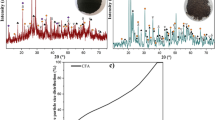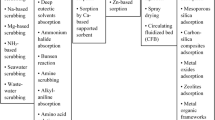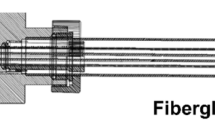Abstract
The work presented in this paper is an analysis of an energetic and exergetic geothermal energy-assisted adsorption heat transformer. The zeolite 13X-H2O couple is used to recover energy and minimize irreversibility effects. A comparison of the obtained results for a simple adsorption heat transformer with ejector is carried out. It is observed that the ejection system shows a lower total of irreversibility than the simple system. The simulation results show that the exergetic performance and efficiency of a cycle of an adsorption heat transformer with ejector are important. It is 12 and 10 %, respectively, higher with respect to a base cycle in the same operating conditions.







Similar content being viewed by others
Abbreviations
- T :
-
Temperature [°C]
- P :
-
Pressure [Pa]
- ρ :
-
Density [kg/m3]
- ma:
-
Adsorbed mass [kg/kg]
- ω 0 :
-
Maximal couple adsorbable [m3/kg]
- D, n :
-
Characteristic parameters torque adsorbent/adsorbate (refrigerant)
- ΔH :
-
Enthalpy variation [J/kg k]
- L :
-
Latent heat of evaporation [J/kg]
- R :
-
Constant de la thermodynamics
- Q :
-
Heat energy [J]
- C p :
-
Specific heat [J/kg k]
- COP:
-
Coefficient of performance
- M s :
-
Adsorpt if mass couple [kg]
- h :
-
Enthalpy [J/kg·k], hot
- s :
-
Entropy [J/kg k]
- \( \dot{m} \) :
-
Mass flow [kg/s]
- \( \dot{E}x \) :
-
Exergy [kw]
- Ψ:
-
Exergy content [kJ/kg]
- η :
-
Rendement exergétique
- n :
-
Constant solid/steam
- i :
-
Inlet
- o :
-
Outelet
- m :
-
Medium
- EAHT:
-
Ejector adsorption heat transformer
- AHT:
-
Adsorption heat transformer
- Des:
-
Desorber, desorption, Destruction
- ad:
-
Adsorber, adsorption
- cond:
-
Condenser, condensation
References
Ulku (1986) Adsorption heat pumps. J Heat Recov Syst 6:277–284
Chandra I, Patwardhan VS (1990) Theoretical studies on adsorption heat transformer using zeolite-water vapour pair. Heat Recov Syst CHP 10(5):527–537
Sözen A (2005) Performance parameters of an ejector-absorption heat transformer. Appl Energy 80(3):273–289
Li TX (2014) Integrated energy storage and energy upgrade, combined cooling and heating supply, and waste heat recovery with solid–gas thermochemical sorption heat transformer. Int J Heat Mass Transf 76:237–246
Sözen A (2007) Exergy analysis of an ejector-absorption heat transformer using artificial neural network approach. Appl Therm Eng 27:481–491
Sarkar J (2012) Ejector enhanced vapor compression refrigeration and heat pump systems. Rev Renew Sustain Energy Rev 16:6647–6659
Choudhury B, Saha BB, Chatterjee PK, Sarkar JP (2013) An overview of developments in adsorption refrigeration systems towards a sustainable way of cooling. Appl Energy 104:554–567
Meunier F (2013) Adsorption heat powered heat pumps. Appl Therm Eng 61:830–836
Goetz V, Elie F, Spinner B (1993) Structure and performance of single effect solid/gas chemical heat pumps. Heat Recov Syst CHP 13(1):79–96
Demir H, Mobedi M, Ülkü S (2008) A review on adsorption heat pump. Probl Solut Renew Sustain Energy 12:2381–2403
Franco A, Fantozzi F (2016) Experimental analysis of a self consumption strategy for residential building: the integration of PV system and geothermal heat pump. Renew Energy 86:1075–1085
Baccoli R, Mastino C, Rodriguez G (2015) Energy and exergy analysis of a geothermal heat pump air conditioning system. Appl Therm Eng 86:333–347
Suleiman R, Suleiman R, Folayan Clement, Anafi Fatai, Kulla Dangana (2012) Transient simulation of a flat plate solar collector powered adsorption refrigeration system. Int J Renew Energy Res 2(4):657–664
Qian S, Gluesenkamp K, Hwang Y, Radermacher R, Chun H-H (2013) Cyclic steady state performance of adsorption chiller with low regeneration temperature zeolites. Energy 60:517–526
Wang LW, Wang RZ, Wu JY, Xu YX, Wang SG (2006) Design, simulation and performance of a waste heat driven adsorption ice maker for fishing boat. Energy 31:244–259
Le Pierre’s N, Stitou D, Mazet N (2007) New deep-freezing process using renewable low-grade heat from the conceptual design to experimental results. Energy 32:600–608
Yu N, Wang RZ, Lu ZS, Wang LW, Ishugah TF (2014) Evaluation of a three-phase sorption cycle for thermal energy storage. Energy 67:468–478
Li T, Wang RZ, Kiplagat JK, Kang YT (2013) Performance analysis of an integrated energy storage and energy upgrade thermochemical solid gas sorption system for seasonal storage of solar thermal energy. Energy 50:454–467
Besagni G, Mereu R, Inzoli F (2016) Ejector refrigeration: a comprehensive review. Renew Sustain Energy Rev 53:373–407
Chandra VV, Ahmed MR (2014) Experimental and computational studies on a steam jet refrigeration system with constant area and variable area ejectors. J Energy Convers Manag 73:377–386
Sumeru K, Nasution H, Ani FN (2012) A review on two-phase ejector as an expansion device in vapor compression refrigeration cycle. Renew Sustain Energy Rev 16(7):4927–4937
Yu J, Tian G, Xu Z (2009) Exergy analysis of Joule Thomson cryogenic refrigeration cycle with an ejector. Energy 34:1864–1869
Ahamed JU, Saidur R, Masjuki HH (2011) A review on exergy analysis of vapor compression refrigeration system. Renew Sustain Energy 15:1593–1600
Douss N, Meunier F (1988) Effect of operating temperatures on the coefficient of performance of active carbon–methanol systems. J Heat Recov Syst CHP 8:383–392
Djallel Z, Kherris S (2012) Thermodynamic optimization of an absorption heat transformer Optimisation thermodynamique d'un transformateur de chaleur à absorption. Refrigeration 35:1393–1401
Zhang XD, Hu DP (2012) Performance analysis of the single stage absorption heat transformer using a new working pair composed of ionic liquid and water. Appl Therm Eng 37:129–135
Ersoy HK, Bilir N (2010) The influence of ejector component efficiencies on performance of ejector expander refrigeration cycle and exergy analysis. Int J Exergy 30:425–438
Kilic M, Kaynakli O (2007) Second law-based thermodynamic analysis of water-lithium bromide absorption refrigeration system. Energy 32:1505–1512
Alsuhaibani Z, Ersoy HK, Hepbasli A (2012) Exergetic and sustainability performance assessment of geothermal (ground source) ejector heat pumps. Int J Exergy 11(3):371–386
Author information
Authors and Affiliations
Corresponding author
Additional information
Technical Editor: Jose A. dos Reis Parise.
Rights and permissions
About this article
Cite this article
Alami, A., Makhlouf, M., Lousdad, A. et al. Energetic and exergetic analyses of adsorption heat transformer ameliorated by ejector. J Braz. Soc. Mech. Sci. Eng. 38, 2077–2084 (2016). https://doi.org/10.1007/s40430-016-0593-8
Received:
Accepted:
Published:
Issue Date:
DOI: https://doi.org/10.1007/s40430-016-0593-8




